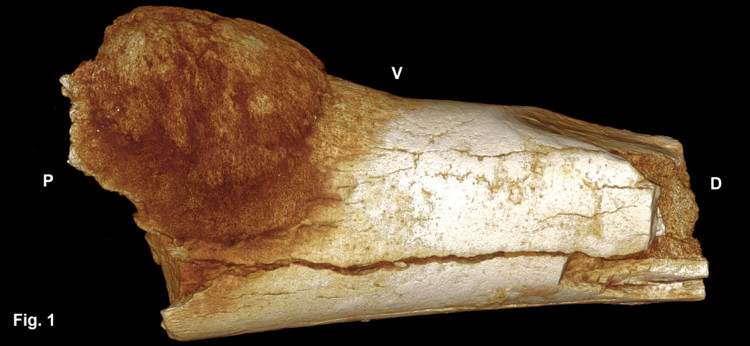Fossil findings suggest that cancer has been around since prehistoric times
Finding cancer that has existed for millions of years has marked an important milestone in ancient history, and changes in preconceptions, concepts that suggest cancer is a disease of modern times.
The cancer prevented Homo sapien from growing somewhere around 200,000 years ago. Scientists have known the presence of cancer in ancient times, when they discovered the evil monster disease in many dinosaurs of the Cretaceous period. But the mystery still covers why cancer cells still evolve parallel to human genes.
Recently, a study discovered a 1.7 million-year-old malignant tumor in the toes of an extinct ancient human being, the oldest cancer case found in humans. .
The discovery of cancer that has existed on humans for millions of years has marked an important milestone in ancient history, and changes in preconceptions, concepts that suggest that cancer is a disease of modern times, such as Studies six years ago have shown that the ancients did not have cancer.

Bone samples of ancient people were found.
"Our new findings clearly demonstrate that prehistoric people also have cancer. And worse, in this age, we are also affected by many other sources of cancer, for example. like chemicals that did not exist in prehistoric times, "co-author of the study of cancer in prehistoric humans, said Professor Zach Throckmorton at Lincoln University.
It is not wrong to say that modern people have to endure this cancer more than their ancestors, but to be more accurate, we have to understand that cancer has followed people throughout the evolutionary path. And it is almost clear that modern life today increases the incidence of cancer.
The international research team from the University of Witwatersrand's Institute for Evolutionary Research and the Center for Ancient Science Research in South Africa discovered the specimen of this family in Swartkran Cave, South Africa, though it is unclear if the specimen is still unknown. Which object belongs to the specific person.
Using hologram technology, scientists track malignant tumors in the toes of the unknown species, and find that the ancestors of this human race had bone-forming bone cancer , a Cancer is very dangerous. "This disease is very similar to bone cancer in modern humans today," added Throckmorton.
Anthropologists are not sure how and when cancer has emerged in human lines.

300 BC, Hipporates called cancer a karkinos, meaning "crab" in Latin.
Around 300 BC, Hipporates called cancer karkinos , meaning "crab" in Latin. The document he recorded about a cancer patient said: "The blood vessels spread to the four sides, like the legs of a crab."
Before that time 2,000 years ago, it was believed that the ancient Egyptians recorded the first case of cancer, those medical records were named Edwin Smith Papyrus . Its author noted 8 cases of breast cancer and noted that "there is no cure". The oldest evidence of prostate cancer lies in the rest of a 2,250-year-old Egyptian mummy.
These historical gaps have gradually blamed the researchers, making them think that cancer is a disease of modern times, caused by a lifestyle that does not protect health and many parts of pollution from waste and dust . Another controversial study suggests that cancer is completely a disease of modern times, because there is not much evidence that cancer is in prehistoric human bones or in Egyptian mummies.

The tumor was discovered after using many shaping technology.
Such studies are based on evidence that cancer does not actually appear in human history: the elderly are more likely to be cancer-prone, and nearly every mummy studied is under 50 years old. Many other factors also affect humans during their existence, such as ash and smoke from fire, poisonous mushrooms.Congenital cancers such as bone cancer are rare in fossils found today.
Fortunately, we have found evidence of cancer that has emerged since prehistoric times. Researchers are not sure if the cancer itself killed the ancient person, but the tumor on the other leg has affected that person's ability to walk, like the leg bone cancer affected. to this day.
"Bone cancer is considered to be one of the most painful types of cancer, especially when the cancer is at the foot where the body weight weighs heavily ," Professor Throckmorton said.
The authors of this study hoped that with modern medical technology growing, they could conduct further research on fossil tumors. From discovering how cancer affects human history, we can be more prepared for future cancer treatment.
Reference: motherboard
- Find jewels in a 100 million year old son
- People who drink beer and drink hot tea smoke increase 5 times the risk of esophageal cancer
- The intact fossil after 120 million years reveals a mysterious loss of prehistoric animals
- The 125 million-year fossil remains intact, the hair of prehistoric mice
- Detecting bullet holes on millions of years old prehistoric skulls
- Fossil discovery of a new dinosaur
- Deciphering the incredible life of prehistoric people
- The first massacre in human history
- Human jaws evolved from ancient fish
- Unexpected facts about the time of
- Detecting fossils of human bones living on trees
- The most frightening prehistoric monster mystery
 Discovered an ancient centipede fossil 99 million years old
Discovered an ancient centipede fossil 99 million years old Discovered bat-like dinosaurs in China
Discovered bat-like dinosaurs in China Discovered a 200-year-old bronze cannon of the coast
Discovered a 200-year-old bronze cannon of the coast Discover 305 million-year-old spider fossils
Discover 305 million-year-old spider fossils